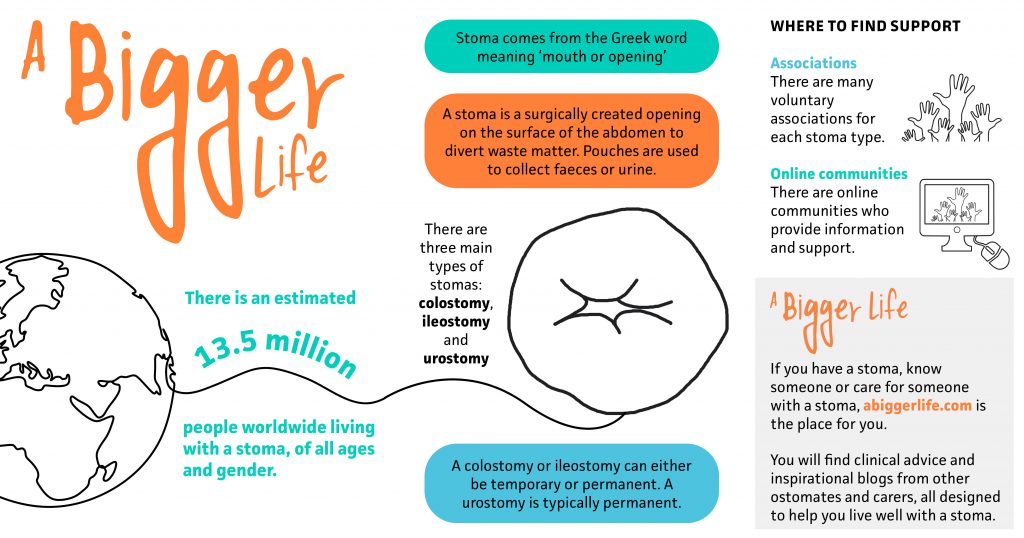
What is a stoma?
There is an estimated 13.5 million people worldwide living with a stoma, yet it is rarely discussed and is, in many ways, a hidden condition. With the correct support and products, it is possible to continue to live a fulfilling life with a stoma.
What is a stoma?
Stoma comes from the Greek word meaning ‘mouth or opening’
A stoma is a surgically created opening on the surface of the abdomen to divert waste matter- faeces or urine. To help with this an odour proof/discreet pouch is worn outside the abdomen to collect the waste.
Types of stoma
There are three main types of stomas – colostomy, ileostomy and urostomy.
A colostomy or ileostomy can either be temporary or permanent. A urostomy is typically permanent.
A colostomy is usually on the left hand side of the abdomen. The output will vary from a solid to semi solid bowel motion output, because of this would normally require a closed pouch.
An ileostomy is usually on the right hand side of the abdomen. The output would alter between being loose to semi solid, because of this would normally require a drainable pouch that empties at the bottom.
A urostomy is usually on the right hand side of the abdomen. The output is urine so requires a pouch with a tap outlet to enable emptying.
Common reasons for stoma surgery
There are many reasons why a stoma may be formed. Faecal or bowel stomas (colostomy and ileostomy) need to be created if you have been diagnosed with:
Colon or rectal cancer, diverticular disease, inflammatory bowel disease (Crohn’s or Ulcerative Colitis), faecal incontinence or as a result of an accident.
A urinary stoma (urostomy / ileal conduit) is usually created if you have been diagnosed with bladder cancer or benign conditions such as chronic inflammation, incontinence or birth defects.
Where to get support
Adjusting to a stoma can be difficult at first, but after the initial recovery period and with good support, the majority of people are able to enjoy a full and active life. There are many ways to seek support both before and after surgery.
Associations
There are many voluntary associations across the stoma types, who are very active among different communities. They exist as a vital support network and information guide. They also have booklets of information that they will provide throughout the year.
Online communities
There are online communities who provide very good information and support from people in a similar situation.
A Bigger Life
If you have a stoma, know someone with a stoma or care for someone with a stoma, abiggerlife.com is the place for you.
You will find clinical advice and inspirational blogs from other ostomates and carers, all designed to help you live well with a stoma.
Our clinical advice covers everything from pre-op to recovery to getting back to everyday life. You will find blogs, infographics and articles in each of these journey stages.

You might be interested in:
Related Advice
Do you have a story you want added to A Bigger Life?
Submit your own story and we will get back to you.

